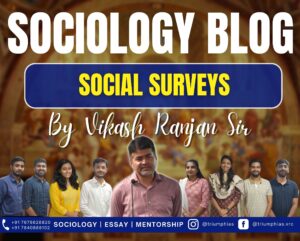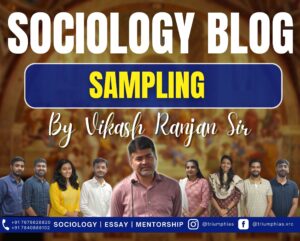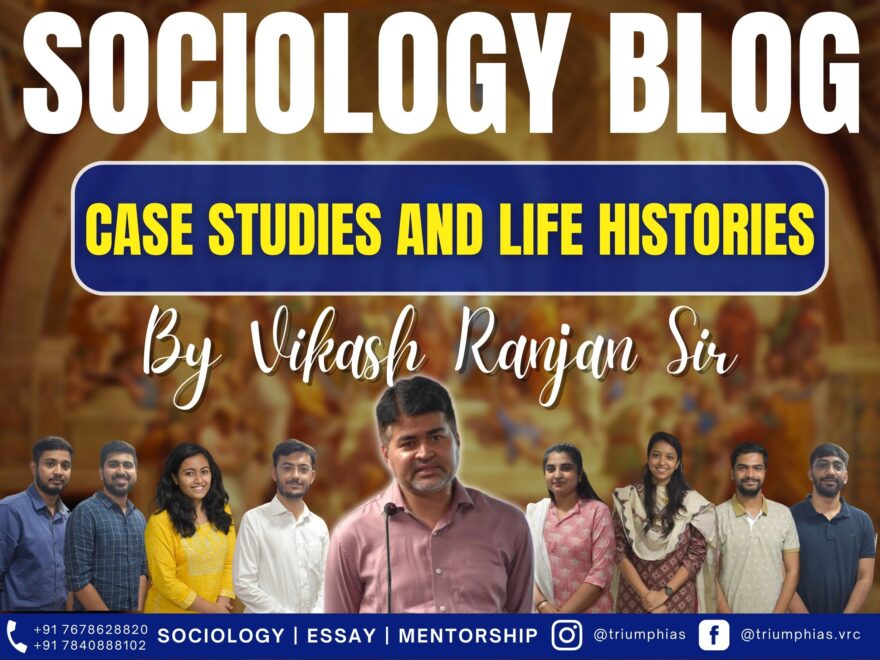Insights into Case Studies and Life Histories
(Relevant for Sociology Optional for Civil Services Examination)

Case Studies
- A case study may examine an individual institution, community, social grouping, single event, or a specific social activity.
- Howard Becker positions the primary objective of case studies as gaining an in-depth understanding of the examined subject.
Characteristics of a Case Study
- Tim May believes that the essence of case studies is to highlight the situational nature of societal dynamics – understanding the backdrop is crucial to grasp societal nuances.
- Contradicting general societal theories is possible through specific societal case studies. For instance, Gough’s examination of the Nayar community revealed non-universal marital-based family setups.
- Typologies or categorizations of societal phenomena can emerge from case studies. Douglas, for example, posited that the varying social interpretations of suicide could be uncovered through case studies.
- They serve as platforms for hypothesis formulation, later testable against fresh data or subsequent research. Paul Willis’s educational institution study, for instance, led to multiple hypothesis formations about the nexus between education and capitalist societies, sparking further research by educational sociologists.
- Bryman views the inherent analytical depth and insights in case studies as potentially more valuable than their representational accuracy.
Varieties of Case Studies
Critical case: Useful for hypothesis testing. Bryman cited a religious sect study focused on members’ reactions to an unfulfilled end-of-the-world prophecy.
Exceptional or singular case: Cases where only one instance is known. Margaret Mead’s Samoa research, highlighting unique gender dynamics, is an illustration.
Illuminative case: Facilitates insights into previously concealed societal aspects. Eileen Barker’s exploration of the ‘Moonies’ religious sect is a case in point.
Time-lapse case: Facilitates observations at multiple points, revealing societal transformations.
The representative or typical case: However Bryman say that Yin’s term used here is misleading and it would be better to call it an exemplifying case. One case cannot be representative but it can illustrate or exemplify a common social phenomenon
Limitations
- The inability to extrapolate from case study outcomes is a primary limitation. Determining the applicability of findings from one societal instance to others is challenging.
- Bryman (2012) proposed a possible solution: conducting multiple similar case studies. However, he notes potential inconsistencies when comparing studies by different researchers or even the same researcher at varied times. Simultaneous data collection by a unified research team can mitigate this.
Life history
- Bryman sees life histories as an in-depth case study of an individual, sometimes referred to as the biographical approach.
- The predominant life history research tool is the unstructured interview. Plummer believes life history can serve as perception enhancers, aiding researchers in grasping the conceptual understanding of their subjects.
- Such life histories, rich in detail, offer clarity in the maze of complex sociological theory. Life history offer a window into the personal perspective, potentially challenging external preconceptions.
Analytical Induction: Life histories, like case studies, can invalidate current theories or stimulate new ones. Sequential life history can validate, adjust, and revalidate hypotheses, enabling the evolution of sociological theories.
Feminist Perspective: Certain feminists find value in life history research for empowering women. Maria Mies’s discussions with violence-affected women illuminated the societal roots of such violence, challenging personal guilt perceptions.
Critical Researcher’s Perspective: For them, life history research can uplift individual self-awareness and understanding, prompting introspection about life-defining influences.
Postmodern Perspective: Postmodernism’s focus on life’s fluidity and personal experience diversity finds resonance in life histories. Judith Stacey’s (1996) explorations into the lives of ‘Pam’ and ‘Dotty’ are illustrative.
Lately, multi-person life history studies have emerged. For instance, C. Squire’s (2000) work utilized the life histories of 34 HIV-positive individuals to delve into the HIV experience.

To master these intricacies and fare well in the Sociology Optional Syllabus, aspiring sociologists might benefit from guidance by the Best Sociology Optional Teacher and participation in the Best Sociology Optional Coaching. These avenues provide comprehensive assistance, ensuring a solid understanding of sociology’s diverse methodologies and techniques.
META TAGS: Case studies, life histories, sociological research, Howard Becker, Tim May, societal dynamics, Bryman, hypothesis testing, representative case, life history research, feminist perspective, postmodern perspective, analytical induction, multi-person life history, HIV experience.
 |
 |
Explore Sociology Optional Syllabus
Paper-1
FUNDAMENTALS OF SOCIOLOGY
- Sociology – The Discipline
- Sociology as Science:
- Research Methods and Analysis:
- Sociological Thinkers:
- Karl Marx- Historical materialism, mode of production, alienation, class struggle.
- Emile Durkheim- Division of labour, social fact, suicide, religion and society.
- Max Weber- Social action, ideal types, authority, bureaucracy, protestant ethic and the spirit of capitalism.
- Talcott Parsons- Social system, pattern variables.
- Robert K. Merton- Latent and manifest functions, conformity and deviance, reference groups.
- Mead – Self and identity.
- Stratification and Mobility:
- Concepts- equality, inequality, hierarchy, exclusion, poverty and deprivation.
- Theories of social stratification- Structural functionalist theory, Marxist theory, Weberian theory.
- Dimensions – Social stratification of class, status groups, gender, ethnicity and race.
- Social mobility- open and closed systems, types of mobility, sources and causes of mobility.
- Works and Economic Life:
- Social organization of work in different types of society- slave society, feudal society, industrial /capitalist society
- Formal and informal organization of work.
- Labour and society.
- Politics and Society:
- Sociological theories of power.
- Power elite, bureaucracy, pressure groups, and political parties.
- Nation, state, citizenship, democracy, civil society, ideology.
- Protest, agitation, social movements, collective action, revolution.
- Religion and Society:
- Sociological theories of religion.
- Types of religious practices: animism, monism, pluralism, sects, cults.
- Religion in modern society: religion and science, secularization, religious revivalism, fundamentalism.
- Systems of Kinship:
- Family, household, marriage.
- Types and forms of family.
- Lineage and descent.
- Patriarchy and sexual division of labour.
- Contemporary trends.
- Social Change in Modern Society:
- Sociological theories of social change.
- Development and dependency.
- Agents of social change.
- Education and social change.
- Science, technology and social change.
Paper-2
INDIAN SOCIETY: STRUCTURE AND CHANGE
INTRODUCING INDIAN SOCIETY
- Perspectives on the study of Indian society:
- Indology (GS. Ghurye).
- Structural functionalism (M N Srinivas).
- Marxist sociology (A R Desai).
- Impact of colonial rule on Indian society :
- Social background of Indian nationalism.
- Modernization of Indian tradition.
- Protests and movements during the colonial period.
- Social reforms.
SOCIAL STRUCTURE
- Perspectives on the study of Indian society:
- The idea of Indian village and village studies.
- Agrarian social structure – evolution of land tenure system, land reforms.
- Caste System:
- Perspectives on the study of caste systems: GS Ghurye, M N Srinivas, Louis Dumont, Andre Beteille.
- Features of caste system.
- Untouchability – forms and perspectives.
- Tribal communities in India
- Definitional problems.
- Geographical spread.
- Colonial policies and tribes.
- Issues of integration and autonomy.
- Social Classes in India:
-
- Agrarian class structure.
-
-
- Industrial class structure.
- Middle classes in India.
-
- Systems of Kinship in India:
- Lineage and descent in India.
- Types of kinship systems.
- Family and marriage in India.
- Household dimensions of the family.
- Patriarchy, entitlements and sexual division of labour
- Religion and Society:
- Religious communities in India.
- Problems of religious minorities.
- Patriarchy, entitlements and sexual division of labour
SOCIAL CHANGES IN INDIA
- Visions of Social Change in India:
- Idea of development planning and mixed economy
- Constitution, law and social change.
- Education and social change.
- Rural and Agrarian transformation in India:
- Programmes of rural development, Community Development Programme, cooperatives,poverty alleviation schemes
- Green revolution and social change.
- Changing modes of production in Indian agriculture.
- Problems of rural labour, bondage, migration.
3. Industrialization and Urbanisation in India:
-
- Evolution of modern industry in India.
- Growth of urban settlements in India.
- Working class: structure, growth, class mobilization.
- Informal sector, child labour
- Slums and deprivation in urban areas.
4. Politics and Society:
-
- Nation, democracy and citizenship.
- Political parties, pressure groups , social and political elite
- Regionalism and decentralization of power.
- Secularization
5. Social Movements in Modern India:
-
- Peasants and farmers movements.
- Women’s movement.
- Backward classes & Dalit movement.
- Environmental movements.
- Ethnicity and Identity movements.
6. Population Dynamics:
-
- Population size, growth, composition and distribution
- Components of population growth: birth, death, migration.
- Population policy and family planning.
- Emerging issues: ageing, sex ratios, child and infant mortality, reproductive health.
7. Challenges of Social Transformation:
-
- Crisis of development: displacement, environmental problems and sustainability
- Poverty, deprivation and inequalities.
- Violence against women.
- Caste conflicts.
- Ethnic conflicts, communalism, religious revivalism.
- Illiteracy and disparities in education.
Why Vikash Ranjan’s Classes for Sociology?
Proper guidance and assistance are required to learn the skill of interlinking current happenings with the conventional topics. VIKASH RANJAN SIR at TRIUMPH IAS guides students according to the Recent Trends of UPSC, making him the Best Sociology Teacher for Sociology Optional UPSC.
At Triumph IAS, the Best Sociology Optional Coaching platform, we not only provide the best study material and applied classes for Sociology for IAS but also conduct regular assignments and class tests to assess candidates’ writing skills and understanding of the subject.
Choose The Best Sociology Optional Teacher for IAS Preparation?
At the beginning of the journey for Civil Services Examination preparation, many students face a pivotal decision – selecting their optional subject. Questions such as “which optional subject is the best?” and “which optional subject is the most scoring?” frequently come to mind. Choosing the right optional subject, like choosing the best sociology optional teacher, is a subjective yet vital step that requires a thoughtful decision based on facts. A misstep in this crucial decision can indeed prove disastrous.
Ever since the exam pattern was revamped in 2013, the UPSC has eliminated the need for a second optional subject. Now, candidates have to choose only one optional subject for the UPSC Mains, which has two papers of 250 marks each. One of the compelling choices for many has been the sociology optional. However, it’s strongly advised to decide on your optional subject for mains well ahead of time to get sufficient time to complete the syllabus. After all, most students score similarly in General Studies Papers; it’s the score in the optional subject & essay that contributes significantly to the final selection.
“A sound strategy does not rely solely on the popular
Opinion of toppers or famous YouTubers cum teachers.”
It requires understanding one’s ability, interest, and the relevance of the subject, not just for the exam but also for life in general. Hence, when selecting the best sociology teacher, one must consider the usefulness of sociology optional coaching in General Studies, Essay, and Personality Test.
The choice of the optional subject should be based on objective criteria, such as the nature, scope, and size of the syllabus, uniformity and stability in the question pattern, relevance of the syllabic content in daily life in society, and the availability of study material and guidance. For example, choosing the best sociology optional coaching can ensure access to top-quality study materials and experienced teachers. Always remember, the approach of the UPSC optional subject differs from your academic studies of subjects. Therefore, before settling for sociology optional, you need to analyze the syllabus, previous years’ pattern, subject requirements (be it ideal, visionary, numerical, conceptual theoretical), and your comfort level with the subject.
This decision marks a critical point in your UPSC – CSE journey, potentially determining your success in a career in IAS/Civil Services. Therefore, it’s crucial to choose wisely, whether it’s the optional subject or the best sociology optional teacher. Always base your decision on accurate facts, and never let your emotional biases guide your choices. After all, the search for the best sociology optional coaching is about finding the perfect fit for your unique academic needs and aspirations.
Follow us :
🔎 https://www.instagram.com/triumphias
🔎https://www.youtube.com/c/TriumphIAS
https://t.me/VikashRanjanSociology
Find More Blogs
|
Scope of the subject and comparison with other social sciences |
|||
|
|
|
|
Modernity and social changes in Europe |


One comment